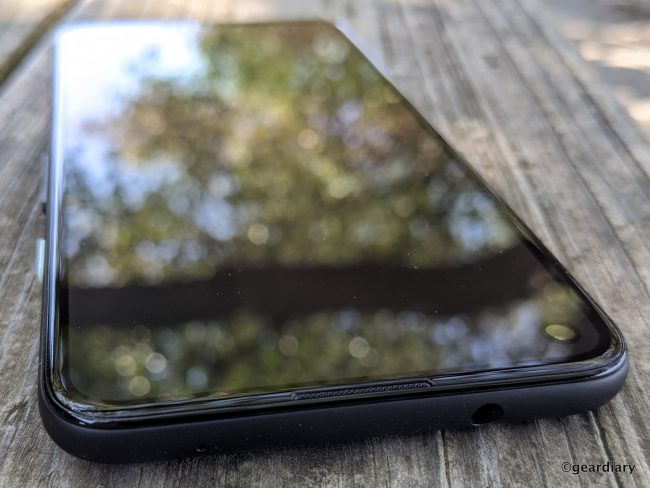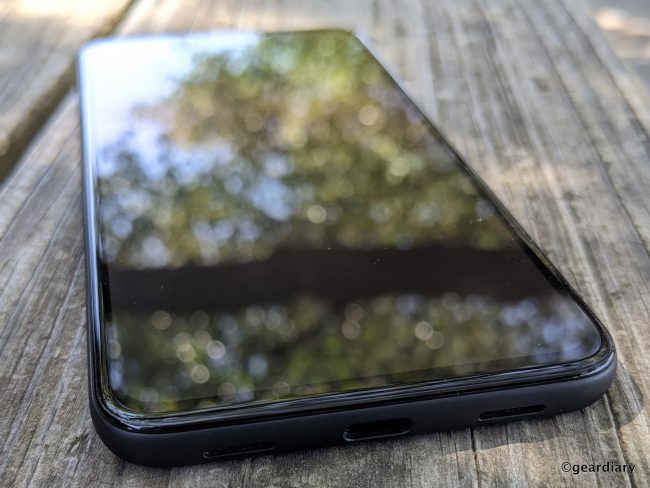It’s no secret that I love my Google Pixel phones. I converted from an iPhone to the Google Pixel 3 XL, then to the Google Pixel 4 XL. One thing both Pixels in common was their amazing cameras and solid builds paired with Pixel-exclusive apps and a true, stock Android experience (which I prefer). Google has just released its budget-priced Google Pixel 4a, and there is so much to like — including its excellent camera.
I should start by saying that the Google Pixel 4a is much smaller than the phones I usually carry. Measuring just 5.7″ tall by 2.8″ wide by 0.35″ thick and weighing 5 ounces, next to the Pixel 4 XL, the size difference calls up comparisons between Arnold Schwartzenegger and Danny DeVito in the movie Twins.
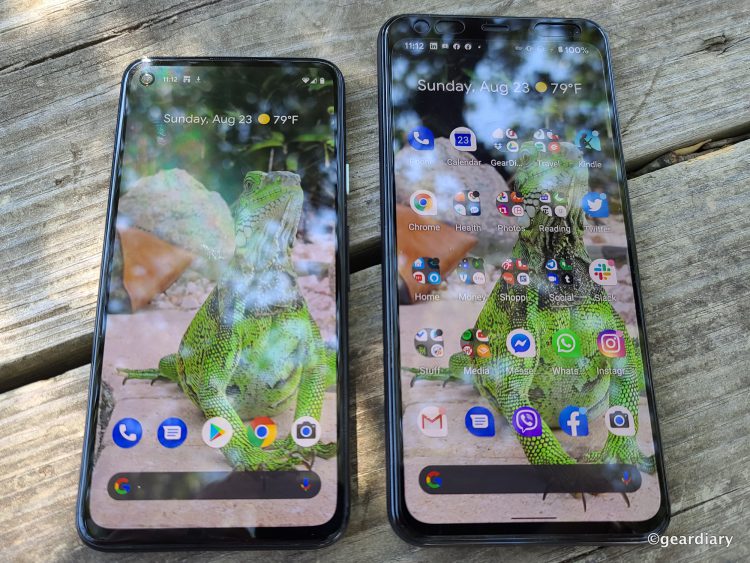
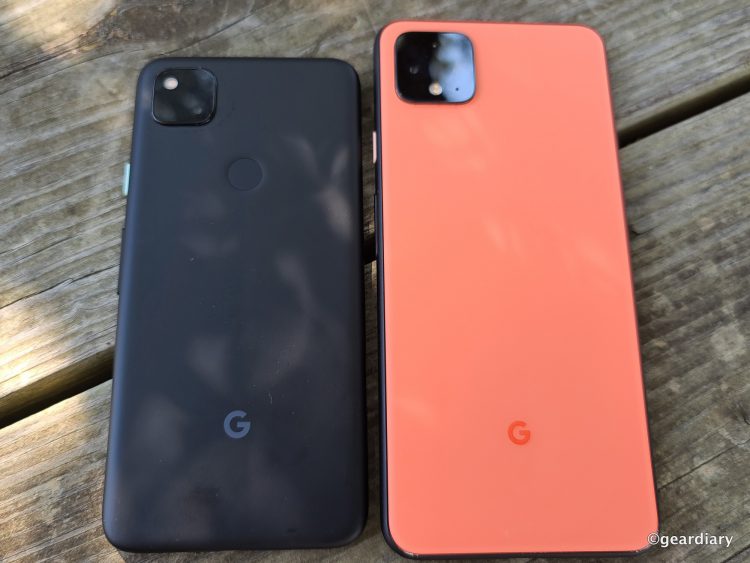
Even though the Pixel 4a is quite different from the Google Pixel 4 and Google Pixel 4 XL, it has brought back some of the things I loved about the 3 series (the fingerprint reader on the backside, for one), and added things that make it stand on its own as a solid choice. Even though it is a budget phone with a polycarbonate body, it doesn’t feel cheap, and the single camera on the back is as good as any other Pixel camera — which means it is excellent. The Google Pixel 4a box includes the phone, an 18W USB-C power adapter, a 1-meter long USB-C to USB-C cable (USB 2.0), a quick start guide, a quick switch adapter, and a SIM tool.
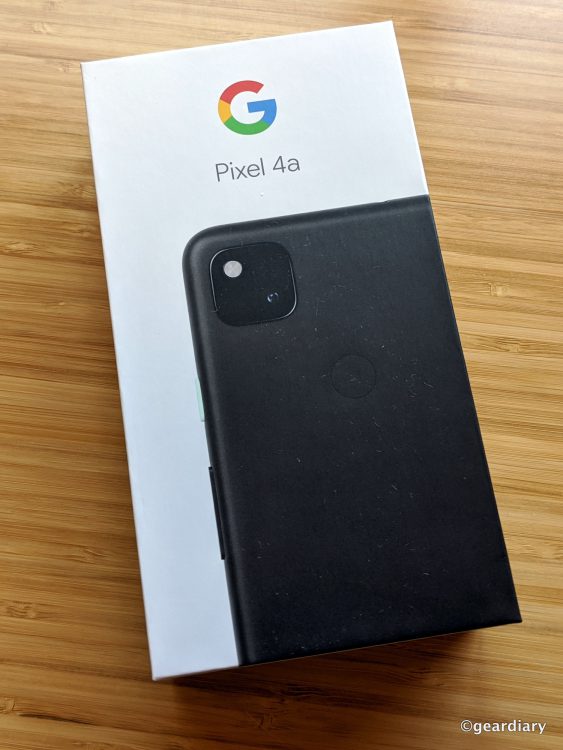
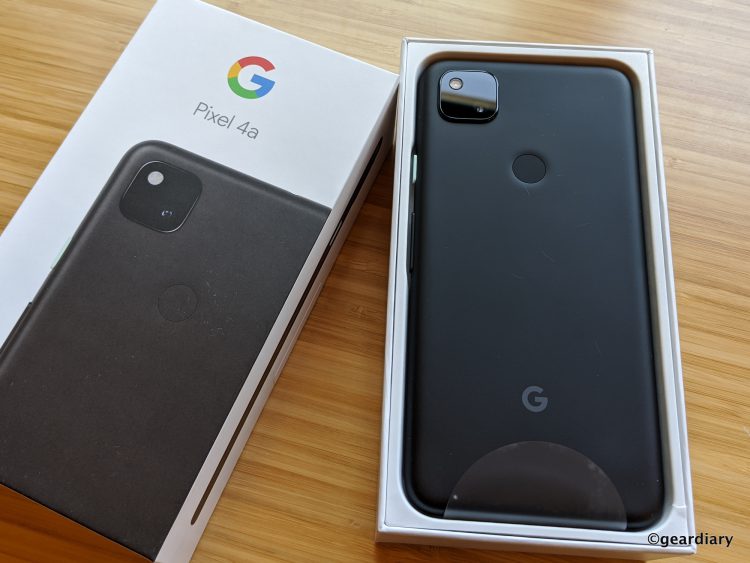
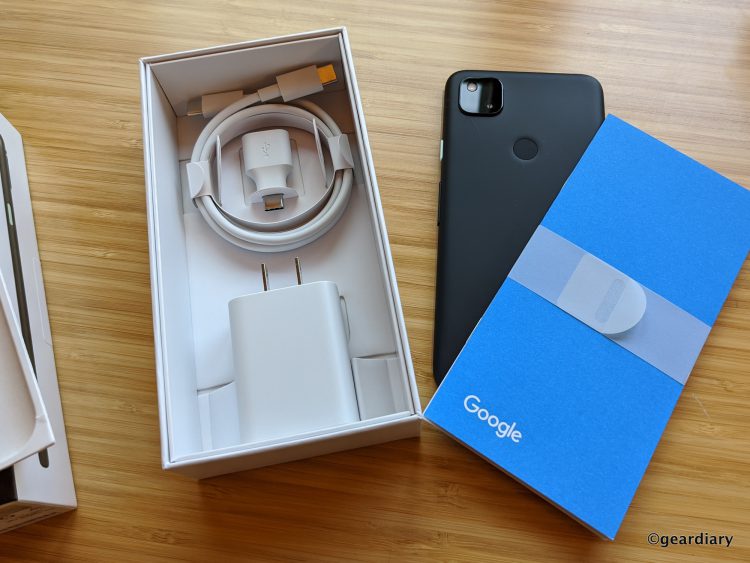
The most significant and immediate difference between the 4a and the other latest Pixel phones is the 4a’s lack of an annoyingly large bezel at the top (or bottom, in the case of the 3 series) of the display. The pricier Pixel 4 XL needed such a large top bezel for all of its extra sensors and the ear speaker, but it cut into the display area and made it feel a bit cramped compared to other full-display devices.
On the Pixel 4a, there is a simple punch-hole which houses the 8-megapixel front-facing camera, and there is an ear speaker bar built into the top of the Gorilla Glass 3; the 5.8″ OLED display area appears to take up nearly the entire front of the device. This is a welcome change from the 4 series.
In hand, the Pixel 4a feels so tiny and light, but it is still large enough to not feel like a toy. I don’t feel cramped when using the phone, as I would if I were to try to use an iPhone 4 or 5, for instance. I still have one of each of those iPhones, and every time I pick one up, I wonder how I managed with such tiny devices. I’d say that for someone who likes a smaller phone, the size might be just right. While the Pixel 4a has a polycarbonate body instead of a more modern glass one, it doesn’t feel cheap or fragile in the least; if you put it in a case, you won’t even notice.
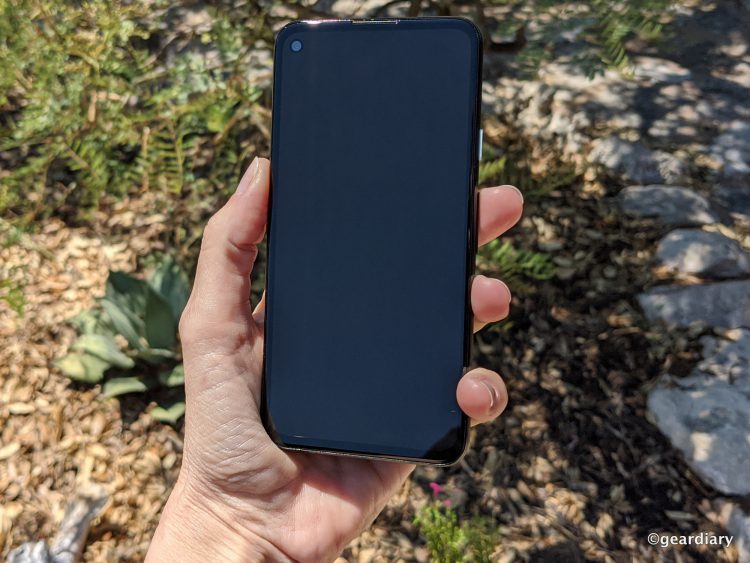
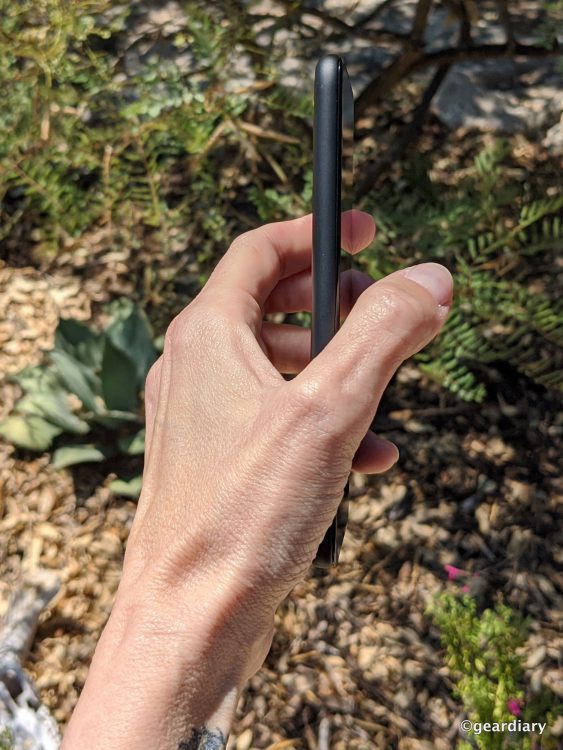
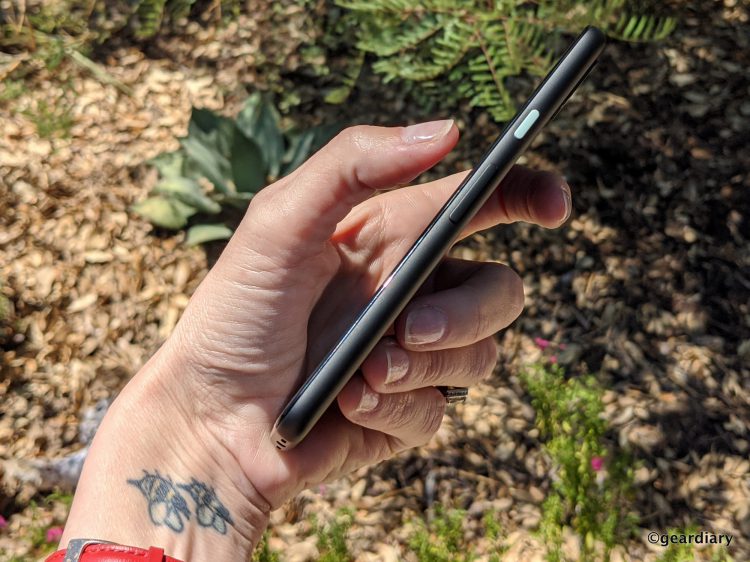
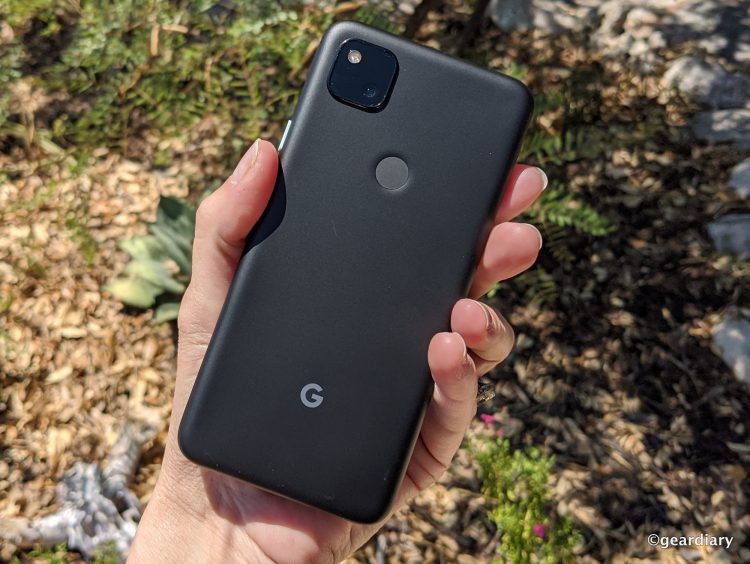
The 4a is available in one color — Just Black, and that’s just fine. On the right side, there is a light green power button with a volume rocker underneath.
On the top, there is a microphone and a 3.5mm headphone jack.
On the left side, there is a single nanoSIM tray.
On the bottom, there is a microphone, a Type-C port, and a speaker.
On the back, there is a small square-shaped camera array that holds the 12.2-megapixel camera. The rear camera has autofocus with dual pixel phase detection, and it offers optical and electronic image stabilization to help keep your photos from being blurry. The only other item in the camera array is the LED flash. Just below that, centered in the back, is a very responsive fingerprint reader. Worth noting is that the fingerprint reader has the swipe for notification scrolling feature that I enjoyed so much on the Pixel 3XL (I miss it on the 4 XL, to be honest).
Inside the phone, there is a 3,140mAh battery (it’s larger than the more expensive Google Pixel 4’s battery!) that adapts to your usage to squeeze out a full day’s power; I got a solid 6 to 7 hours’ use before the phone absolutely had to be recharged, and the phone has QuickCharge for faster power top-offs.
The 4a has 6GB LPDDR4x RAM with a surprisingly generous 128GB user memory. Bear in mind that the more expensive Pixel 3 and 4 both came with 64GB base configurations, and you had to upgrade to the tune of $100 or so for 128GB. I’m hoping that this means we will see more significant user memory amounts available on the upcoming Pixel 5 series, but we’ll see. The processor is a very capable Qualcomm Snapdragon 730G; whether you are gaming or tend to leave a ton of apps running at a time, it can handle it. The phone is not 5G capable, but then, neither are any of the other Pixels yet.
The 4a runs the latest Android 10 with the new Google Assistant and Google Lens. The Pixel 4a also has all of the Google Pixel features that users love — like built-in call screening with transcripts, Now Playing (which identifies music playing around you on the lock screen), personal safety features, bedtime features in the Clock app, and voice recorder transcripts, to name a few. Most importantly, Google has committed to supporting the Pixel 4a for a minimum of three years with OS and security updates. Google has been excellent about delivering monthly updates to its Pixel phones; when you are using a Pixel, you can expect the latest and greatest features as soon as they become available. Worth noting is that there isn’t any mention of IP dust or water-resistance, however. Also missing is the side-squeeze that would pull up the Google Assistant on the 3 and 4 series, but it’s no dealbreaker.
So in and of itself, the Google Pixel 4a is a really good phone at a rock-bottom price.
But then you add in the camera.
The Pixel 4a is capable of taking excellent photos, fantastic portraits, and it also offers astrophotography like the Pixel 3 and Pixel 4 series did. Here are some examples.
Portraits


Astrophotography



But where the Pixel 4a camera really shines, in my opinion, is that it takes excellent photos just about all of the time, no matter what you are shooting. I recently spent some time on a sweltering afternoon taking pictures at the International Waterlily Collection Park in San Angelo with several of the phones I have in for review. The temperature was well over 100º, so my plans of taking methodical and perfectly framed photos of the waterlilies with each of the phones went out the window as I tried to cycle through the phones and get representative photos with each as quickly as possible — so I could escape back to the AC in my Jeep. Even in those less than ideal circumstances, the Pixel 4a did an excellent job of catching the park’s beauty. None of these photos has been filtered or cropped, so they are excellent examples of what you can expect — even if you aren’t an experienced photographer. In my opinion, at this price, there is no better smartphone camera available.












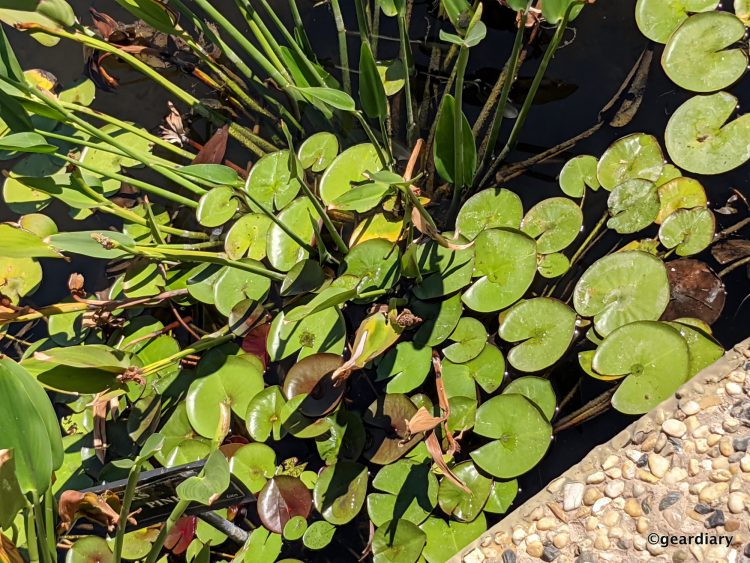

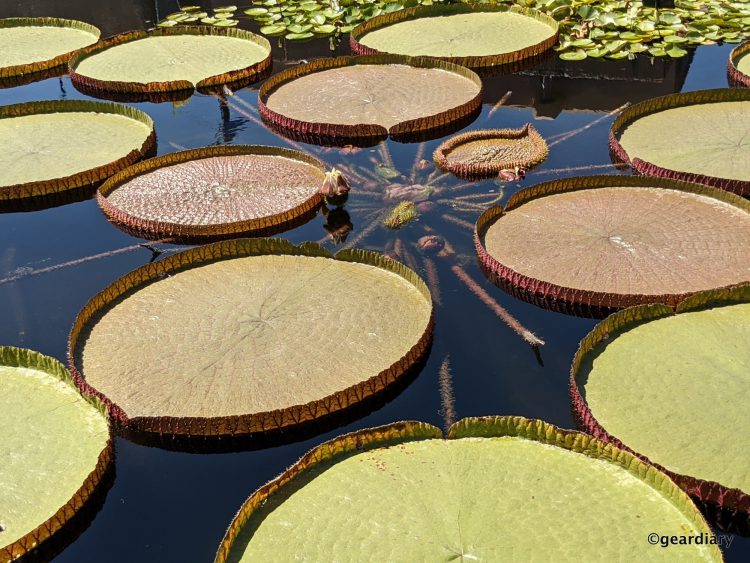

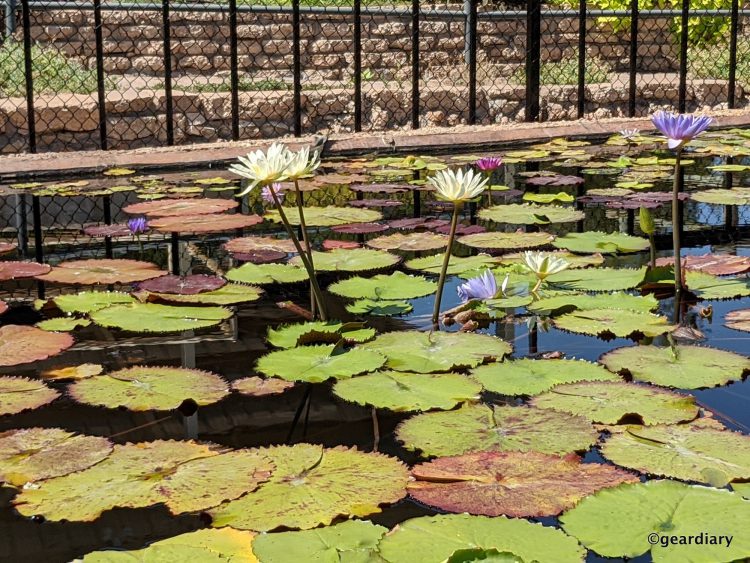


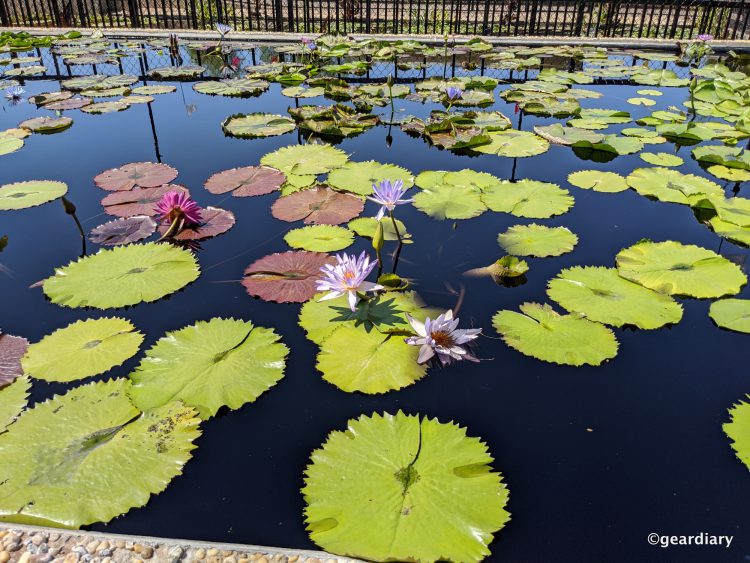





Should you get a Pixel 4a? It depends. There are some trade-offs for getting a budget-priced phone. You won’t get the latest Qualcomm processor, you won’t get a huge display made with the latest Gorilla Glass, and you won’t get wireless charging or 5G. But what you will get is a solidly-built phone that feels good in-hand. The Pixel 4a is fast, and it has better than average battery life; you’ll also get a phone with all of the Google Pixel software tweaks that Pixel users love, and you will get the excellent camera that Pixel users love to tout. If saving some money on your tech is essential to you right now, you will absolutely love this phone because it won’t make you feel like you have settled.
The Google Pixel 4a retails for $349, and it is available directly from the manufacturer (the unlocked version works with all major phone carriers, and there is also a Google Fi option); it is also available from Verizon.
Source: Manufacturer supplied review sample
What I Like: Smaller size is perfect for people who have been wanting a capable yet pocketable phone; Excellent front and back cameras; A minimum of three years of OS and feature updates; Better than average battery life
What Needs Improvement: As long as you are okay with it not being 5G, not having the top-of-the-line Qualcomm processor, not having the latest Gorilla Glass display, and not having wireless charging, you will not be disappointed
